
Public Military companies, whose technologies operate in Ukraine
As always, when something goes down, the system tries to balance, which means something goes up. Since the start of the war in Ukraine, many companies have fallen into operational struggle, forced to fight for survival in hardened economic conditions. On the contrary, the economy started to adapt, specifically, becoming militarized, and companies supporting this trend feel themselves well. There are many successful military-tech startups funded in Ukraine these years and supported by international funds, but for many reasons, they are not public nowadays. However, we can overview the international military-connected companies and their potential. Today, we will have a look at them and their shares, and answer the question, of whether it is beneficial and generally makes sense to invest in them.
Source: www.globaldata.com/
Above is the data of the month's stock rise from 24.02.24 (the beginning of the Ukraine-Russia war) until the end of March 2024. Those are top gainers, and basically the list represents most of the notable companies in their field.
Review of Major Defense Companies and Their Current Standing
BAE Systems:
BAE Systems is a successor to numerous renowned companies in the fields of aircraft, shipbuilding, armored vehicles, armaments, and defense electronics, including the Marconi Company, an early pioneer in radio technology. The British defense giant expressed confidence in achieving annual earnings growth of 12% to 14% in 2024, driven by its extensive order book for fighter jets, submarines, and weapons systems. With over 40% of its sales derived from the United States, the company continues to see medium-term growth opportunities in the region. Shares of BAE have surged by 80% over the last two years, significantly outperforming the FTSE 100, which rose only 10% in the same period.
L3Harris Technologies, Inc.:
As a leading American defense contractor and technology services provider, L3Harris recently exceeded Wall Street's expectations for second-quarter profits and raised its 2024 revenue outlook. This growth is attributed to strong global demand for weaponry amid heightened geopolitical tensions. The company posted adjusted net income of $3.24 per share, surpassing estimates of $3.18. L3Harris, alongside Northrop Grumman, is a top supplier of rocket motors crucial for guided multiple-launch rocket systems, instrumental in Ukraine's defense. Revenue estimates for 2024 now range between $21.0 billion and $21.3 billion, reflecting a solid 13% increase in overall sales for the most recent quarter.
Northrop Grumman Corporation:
Northrop Grumman, a multinational aerospace and defense leader with over 95,000 employees, has continued to play a prominent role in global defense. At Eurosatory 2024, the company announced plans to co-produce medium-caliber ammunition in Ukraine, financed entirely by Ukrainian funds. This strategic move aligns with its broader initiatives in international defense collaboration. Recently, Northrop Grumman’s board authorized an additional $3 billion for stock repurchases, bringing the total to $4.2 billion, reflecting confidence in long-term growth. Despite some market challenges, this reinforces the company’s robust financial outlook.
Lockheed Martin Corporation:
Lockheed Martin is a major player in global defense and aerospace, with diverse worldwide operations. Although the company reached an all-time high stock price of $614.61 in October 2024, its share value has since dropped to $482.06, marking a 21.56% decline and a $30 billion reduction in market capitalization. Despite this, recent developments, such as the U.S. State Department’s approval of Ukraine’s request for $266.4 million in F-16 sustainment services, underscore Lockheed Martin’s ongoing relevance in addressing geopolitical threats. Long-term performance will hinge on several factors, including public perception influenced by figures like Elon Musk, whose criticisms have impacted stock sentiment.
General Dynamics Corporation (GD):
General Dynamics has faced mixed fortunes compared to its competitors. While it remains a major aerospace and defense corporation, its financial metrics, such as EBITDA and free cash flow growth, have been less impressive. Despite increasing its share repurchase authorization by 10 million shares, this has not significantly reduced its outstanding shares since 2023. Downgrades in ratings and price target reductions reflect investor skepticism. However, as challenges in aerospace and submarine production ease, the company may see improved performance, though its current outlook is less optimistic compared to its peers.
Raytheon (RTX) Corporation:
Raytheon benefits from operating in a high-barrier defense sector, with expertise and government clearances providing a competitive edge. Geopolitical tensions in Ukraine and Taiwan have spurred demand for its advanced defense systems. In Q3 2024, the company exceeded revenue and earnings expectations, with enhanced cost efficiency driving better operating margins. However, longer-term growth remains moderate due to shareholder dilution and potential demand fluctuations. Despite these challenges, Raytheon’s strategic positioning ensures its relevance in addressing global security concerns.
Huntington Ingalls Industries, Inc. (HII):
HII is the largest military shipbuilding company in the United States, responsible for critical submarine and aircraft carrier production. Despite increased demand driven by global tensions and China’s naval expansion, HII faces persistent labor shortages and supply chain disruptions, which have hindered its ability to capitalize on these opportunities. The company recently lowered its 2024 revenue outlook due to uncertainties in agreements with the U.S. Navy, contributing to a 7% decline in share value. Additionally, Chinese sanctions on U.S. companies in October 2024 further impacted HII’s stock, which dropped by 26%. In the short term, the company faces significant challenges.
Conclusion
Overall, these companies present strong options for defensive investments. While HII and General Dynamics face more uncertainty, they remain viable choices for those looking to indirectly support Ukraine. Companies like BAE Systems, L3Harris, and Raytheon stand out for their robust positioning and ability to adapt to evolving geopolitical demands. However, individual investment decisions should consider each company’s specific challenges and growth potential in the defense sector.
